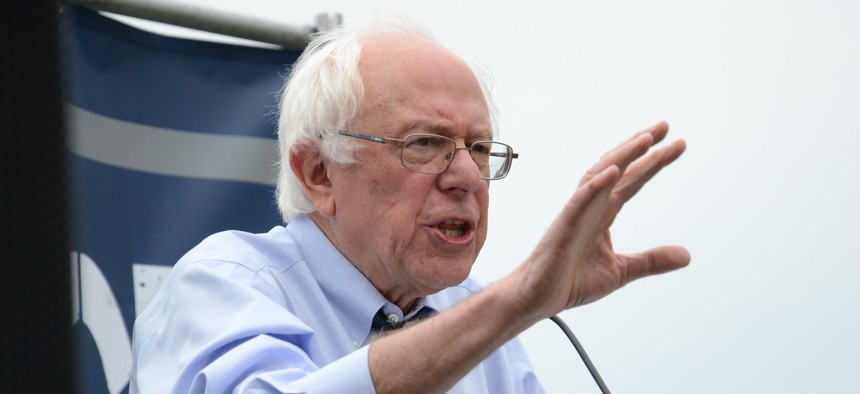
AFGE
Bernie Sanders and the Age Question
He would be the oldest newly-elected president by a wide margin. Will voters care?
In recent weeks, many have started treating Sen. Bernie Sanders' campaign for the 2016 Democratic presidential nomination seriously, but without addressing or even acknowledging the elephant in the room—Sanders' age.
Sanders, now 73 years old, will be turning 75 on Sept. 8, 2016, two months before the presidential general election. That makes him six years and six weeks older than former Secretary of State Hillary Clinton, the strong favorite for the Democratic nomination.
Clinton, 67, will be turning 69 on Oct. 26, 2016, about two weeks before the election. This is not to argue that Clinton is too old to run or serve; if elected, she would be about eight months younger than Ronald Reagan was when he won his first term in 1980. People age at different paces, and there is debate over whether Reagan's capacity began getting taxed either late in his first term (as his son maintains), during his second term, or not until he left office. But I suspect that most people would agree that being 69 years old when first elected president is at the very high end of the acceptable age range.
For those on the left who believe that raising Sanders' age as a consideration is a cheap shot: If they weren't too young to have taken that shot at Reagan in 1980, there is a good chance that they took one at Sen. John McCain, who turned 72 about two months before the 2008 election. That's three years younger than Sanders would be if elected.
To be sure, there are some who simply won't see Sanders' age as an issue and would not have a problem with him beating out Reagan by over five years to become the oldest newly elected president in our history. That he would be 79 years old at the end of a first term and 83 at the end of a second, if he were reelected, I guess wouldn't be a concern for them. They might even point out that Reagan lived to 93 years old and that Presidents Jimmy Carter and George H.W. Bush are 90 and 91 years old, respectively, and counting. But I suspect those people are a relatively limited group; most would grow uneasy with the age issue.
My hunch is that while Clinton's campaign people are sometimes annoyed by Sanders and his hearty supporters, the age issue is precisely why they are not feeling threatened by Sanders. Indeed, Sanders is consuming energy on the left that might otherwise be channeled toward former Maryland Gov. Martin O'Malley, who at 52 today and turning 53 in January, is well within the comfort zone that most people would have for presidential ages. I don't see why Clinton would feel threatened by either man, or by former Sen. and Gov. Lincoln Chafee or former Sen. Jim Webb. Yet if one was going to do better than the others, the likeliest would be O'Malley simply because at the end of the day, few will see Sanders as fitting the job description that they have in mind.
My hunch is that in their heart of hearts, relatively few Sanders supporters think he actually will be elected or even beat Clinton, but rather see this as a cause. It's a protest against a Democratic Party that is considerably more liberal today than it was even when Bill Clinton was president, but still isn't liberal enough to suit them. President Obama has not been liberal enough to suit their tastes and Hillary Clinton certainly isn't. Just this Sunday, Chuck Todd on NBC'sMeet the Press put up a graphic showing that while 102 House Democrats backed the North American Free Trade Agreement during Bill Clinton's presidency, only 28 supported Trade Promotion Authority last week. If the centrist-pro-business element within the Democratic Party were any smaller than it is today, you couldn't measure it at all—a mirror image of the demise of moderate Republicans on the other side.
Much has been said in recent days crediting (or blaming, depending upon one's perspective) organized labor with the defeat of the Trade Adjustment Assistance proposal that was needed for any chance of passage of a Trans-Pacific Partnership. A certain amount of credit or blame should also go to the ascendant non-labor Left—the Occupy Wall Street, MoveOn.org, Democracy for America movement, personified by Sen. Elizabeth Warren, which beat out labor on its much-desired Keystone pipeline. This group has at least as much juice in the House and Senate Democratic caucuses as labor, and it is growing, rather than fighting for survival and relevancy. This sector, far more than labor, is where Sanders' campaign is getting its oxygen and nourishment.
The bottom line is that the only person who can stop Hillary Clinton from being the Democratic nominee is Hillary Clinton. How she performs over the next few months, how she projects as being more relevant to the future than to the past, as a candidate of big, bold and new ideas, and whether people can visualize her in the job—those are the thresholds that she has to clear, not these opponents.






